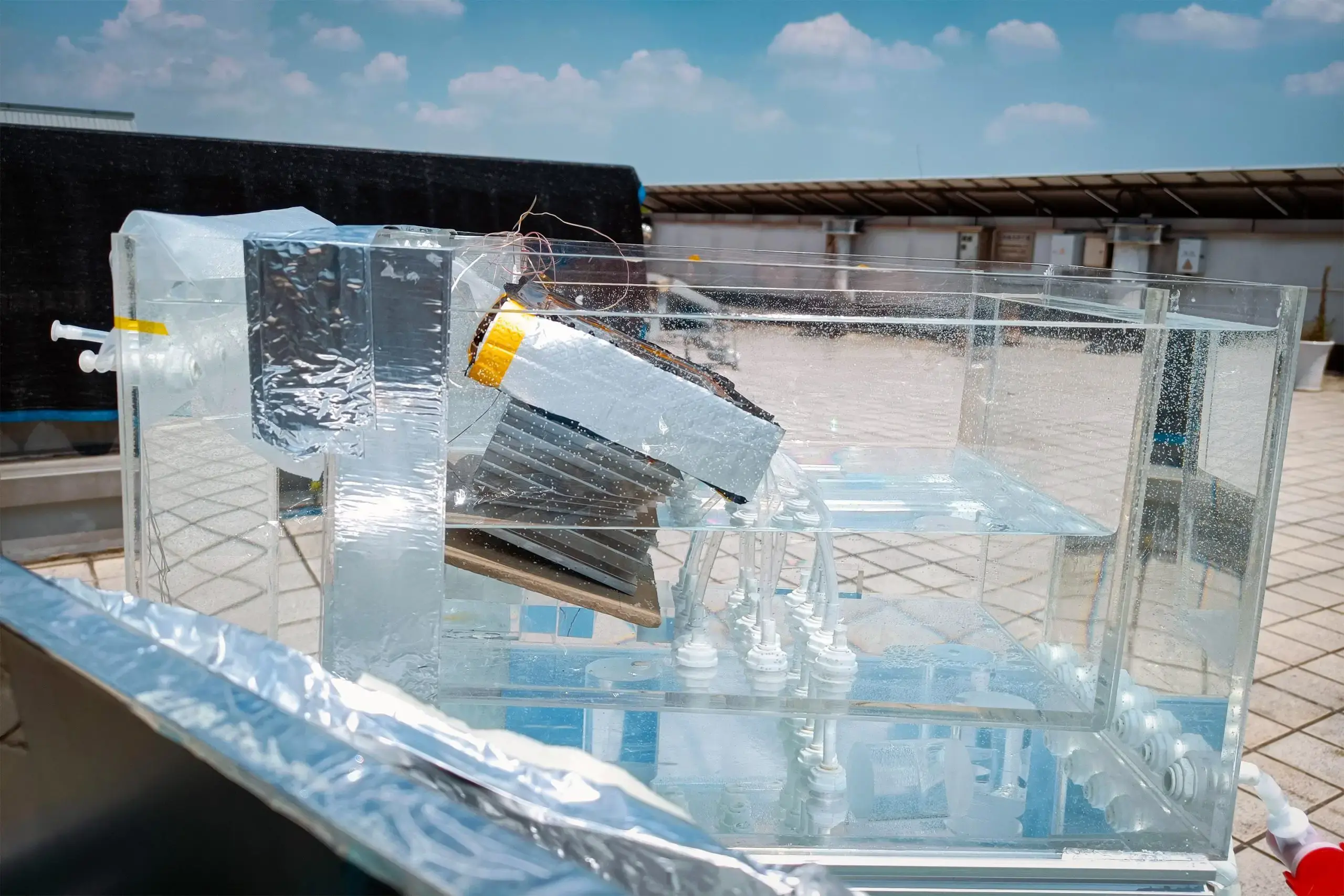Interesting, but very light on details about “cheaper than tapwater”. And the title is clickbait; the system they have is a small scale prototype and the developers only estimate that it would be cheaper than US tap water when scaled up. There is no further detail on costs in the article. Here is the extent of what it says:
the team estimates that the overall cost of running the system [when scaled up] would be cheaper than what it costs to produce tap water in the United States.
The article doesn’t provide any more info on the costs than the above quote. Dunno if the actual journal article provides more detail; I don’t have access. But I would need to see a lot more about how they produced that estimate and how uncertain the estimate is.
You could always try and read the paper to get that information.
Invention number #3425641 from MIT that never saw the light of the day.
How many have? You seem to know a lot about it
Nestlé has entered the chat
What is the magical method we are pimping this week and what is the fatal flaw which will be revealed that makes it entirely impractical for commercial or industrial scale uses? I ask because we seem to (re-)invent various version of the solar still (oh, look - that’s what they’re doing!) every year or two and it’s revolutionary every time because the energy is free and all that’s required is a way to scale it up, prevent the scaled up version from destroying the local ecosystem through hypersalination around the plant when operated at the level needed for efficient collection and distribution to a sizable population, and figure out how to move the billions of tons of water required in a typical year for a medium sized city/population center from the desalination location to a distribution system.
Also, sorry for being shitty. I’m in an especially intolerant mood today.
It’s a solar still that can operate continuously without maintenance as it doesn’t get clogged with salt. That’s a pretty nifty and practical achievement.
They’re also proposing it be used at household scale, because the system is so small, rather than scaled up to factory scale.
Oh god, can you imagine the brine disposal problem with home use? People still pour motor oil down drains.
You are not shitty, you are right.
Been following their progress for awhile. I hope they can get to mass production soon.
Is there a compelling and obvious reason we can’t dilute brine back into the water we let outflow from our waste systems into the oceans rather than dumping it all at once? or maybe dribble flow at river deltas or so?
Large scale desalination produces a lot of brine. There’s no way to release it in small amounts because it isn’t produced in small amounts.
You could but estuaries are incredibly important ecosystems and increased salinity might be harmful to them. Arguably the best place is oceanic areas with strong currents to promote brine mixing with normal seawater. The worst impacts are where the brine sinks and does not mix, creating a dead zone on the sea floor.
The best place is into the desert to make salt like they do in Africa.
Maybe. Anti-biofouling chemicals used by most systems are extremely toxic. If a system avoids using those somehow then this can work.
Does this system use those tho. I thought this was a chem free sunstill
It might be. But I don’t consider this to be a real system until it’s been scaled up and has the cost established. Biofouling isn’t likely to become much of an issue until the system is in use for a time. But since it has no filters it might not need it, I’m not sure.
yes they do that in some facilities, it’s called sewer discharge and can be quiet effective in a well monitored and designed system, surface water discharge uses a similar method of dribbling brine into the water as part of a system that uses ocean currents and tides to disperse the brine back into the ocean.
While brine return is a complicated and important step it’s really not some major ecosystem destroying problem in any of the modern installs - it’s just important to model and monitor the system, the same way sewage systems find a location where currents carry stuff away and allow it to disperse brine return systems do, with brine it’s just stuff that belongs in the ocean anyway so it all mixes back in fairly quickly.
A lot of people seem to like to learn the difficulties involved in a new tech and then just use negative thinking to exaggerate it into a reason the tech will never be useful even after decades of improvement and investment. There are huge projects around the world which have done really positive things for local ecosystems, they’re even refilling the sea of galilee after decades of over extraction and allowing groundwater levels to restore.
The brine from this system is not very concentrated
Sounds good to me
I mean, if there is a reason I really want to know it. That we aren’t doing so suggests there’s some reason, although there’s a decent chance that answer is, “That would cost anything more than dumping it out the nearest window.”
When I first read about this I thought, why not outflow into a tiered salt mine and let evaporation do its thing
This huge! A massive boon for coastal areas if it works at scale, which could help avert the looming water wars.
The water wars prediction is especially interesting because when i was young they always pointed to a few locations where it would happen first, and top of the list was almost always Golan Heights where there were already water related tensions and conflict - however what actually happened is Israel invested in a huge desalination project which now supplies all their tap water, they also supply water to their neighbour Jordan who pays in solar power that’s used to run the system.
Saudi Arabia likewise has eased tensions within it’s borders through huge desalination investment, annalists predicted that competition for water resources would tear the country apart but again what actually happened is they invested in desalination which currently supplies around half their tap water and it’s helped add perceived legitimacy and gained support for the ruling family. Not people i like seeing gaining support but a far better outcome than the chaos and human suffering which was predicted.
Agreed; not the most palatable folks, but an increase in sustainability is always positive :)
This might have an interesting potential yet I am quite sceptical.
Desalination doesn’t just get rid off the salt but also most of the water’s minerals. Lack of minerals in the water used everyday can be harmful for human health and also for agriculture. This poor water can’t provide enough minerals or worst even adsorb the ones from the human body same with the soil. This is why many desalination plants have remineralization process by adding some or reusing minerals extracted from the brine.
If such a system is deployed it would have to address this problem as well as providing solutions to dispose or utilize the brine.
Remineralization of desalinated water: Methods and environmental impact
Israeli Scientists Fear Public Health Risks from Desalinated Seawater
Remineralization is a well known and solved problem in existing processes (RO and distillation). I personally built and ran a high performance RO that produced < 5ppm TDS water on my farm, and experienced the ill effects of drinking demineralized water. Excess thirst, urination and muscle cramps.
The WHO published an excellent study on this issue. The issue is not an actual lack of minerals, as we get very little of our minerals from water, but the fact that your body is not designed to absorb water with zero solutes. Effectively the sensors in your gut go out of span and you end up dumping solutes from your bloodstream instead.
The solution is very simple and cheap, that is to add any salt so that your body can detect it. Sodium chloride is fine, being “normal salt” of course, but I add potassium chloride as most of us get too much sodium as is. This is available as “salt substitute”.
A pinch in a glass or a tablespoon in a 5 gallon jug is enough to completely eliminate any ill effects. Commercially as mentioned you can blend back some of the brine stream. It’s not really a problem as long as you don’t effectively deliver DI water to your customers by accident.
I know we need this, but we can’t drink the ocean withour consequences either.
Are you worried it’s not going to make its way back to the ocean?
I’m worried we will take too much at once. What happens when these machines are running? How do we ensure the water is placed back correctly? You can’t just dump it back in desalinated if everyone is doing it. Thats millions of gallons of fresh water. I’m not sure what the effects are, I just know that they will be and we’ll have to figure that out too.
You are drastically underestimating how much saltwater the earth has.
Yeah, here are some numbers for scale:
There are about 1,335,000,000km^3 of water in the ocean. Humans use around 4600km^3 of water annually. That is only 0.000345% of the volume of the ocean.But have you considered we fuck up the environment every where we go? I get theres a lot of salt water but nobody is going to convince me there are no consequences for mass desalination. Nothing is consequence free here. There is a price for everything we take.
Do you think the salt is just going to get loaded on rockets and sent to the sun?
The earth is a closed system, the salt and the water will eventually make it back to the ocean.
No, I don’t think that. I think we will desalinate the ocean enough for it go up by the few degrees it needs to kill most ocean life. Probably over the span of a few decades. But go off on how this is consequence free i guess.
Yep so u pump the salt water into the desert where evaporation makes salty and the water evaporates into the atmosphere.
The point is, this is a solution to a problem now and probably in the near future. 100% of the world won’t be desalination. This is literal drops in the bucket compared to other resources we take from the earth that are impossible to replenish.
With desalination, don’t worry about the freshwater. Worry about the brine.
Freshwater from seawater isn’t going to do anything more than is currently happening with however an island gets its water.
But brine? That needs to be carefully reintroduced to the ocean (or evaporated on salt flats to farm salt).
Worry not, the ocean’s water levels are about to get A LOT HIGHER thanks to all the melting glaciers!
And since glaciers are freshwater, all the salt can be dumped there. Win win.
(Hoping the /s won’t be needed buuuuut…)
Hahahahaha… hahaha… ha… :(
Right now the salinity of the ocean is decreasing because of the polar ice melting. So to some extent, taking freshwater out of the ocean should be beneficial to preserving its ecological conditions.
It depends on how the brine is reintroduced, which I am sure will be up to the company or individuals will have some sort of collection for households. But salinity going down raises ocean temperatures, as I’ve mentioned in a comment down below so I won’t really restate it gere.
There are concerns, but all of our water makes it’s way to surface systems or rivers and eventually the ocean now already. I don’t think we will be dumping the fresh water we just desalinated directly back…it will be used, to though the sewerage system, and then make its way back the way our water currently does.
That said, there are valid concerns around salt concentration if we dump the salt back, and heat can be an issue as well.
Issues like that worry me. The oceans are already heating up and killing the wildlife. Not that we have much of a choice as water demand rises, but we should be analyzing and watching carefully as we desalinate. We probably won’t and in 100 years there will be headlines like “Ocean water boils sea creatures slive! Who would have seen this coming?”
Pulling more out will only help fight rising sea levels. You don’t need to worry about it going back in, it’s not like everyone’s gonna start dumping millions of gallons of freshwater into coastal estuaries or anything.
plus the concentrated brine from desalinization needs to go somewhere - worrying about taking too much salt from the ocean probably ranks lower than worrying about the brine being disposed of incorrectly. I like HopeOfTheGunblade’s idea of mixing it with the cleaned-up wastewater, there’s a sort of balance there.
Decreased salination leads to hotter oceans. Mass desalination combined with the reduced salination from melting ice caps could pose serious threats to already fragile ocean life. Humanity is always looking for a savior instead of striving for balance.
Take out salt water -> separate freshwater from brine -> use the fresh water -> combine cleaned wastewater with brine -> reintroduce. Seems pretty balanced to me, at least by human standards. The salt isn’t dumped down a mineshaft.
Desalinization plants dumping the brine straight back into the ocean, raising the concentration of salt in the region and poisoning the local wildlife, that’s something I’ve heard of happening, but it sounds like this system is intended to be way smaller, operated at a household level. People dumping the brine into the dirt, sterilizing it, or in local streams could be a problem.
I don’t know, it just seems like desalinization (not necessarily this version) is more of an effort towards balance than endlessly draining aquifers or damming rivers.
Mass desalination combined with the reduced salination from melting ice caps could pose serious threats to already fragile ocean life.
I’m not sure how the first part is relevant/practical, given that the complaints about desalinization plaints is the increased salinity due to the hypersalinated waste produced after the desalinizated water is extracted. Wouldn’t desalinization plants’ hypersalination counteract the hyposalination caused by the glaciers rather than exacerbate it (obviously this would be difficult to not have the waste concentrated and cause local environment issues)?
Definitely something needing consideration. Currently reverse osmosis plants are pumping super saline water out. I haven’t looked too closely at how much damage they’re doing. I’ve heard it’s a problem they’re trying to address
I also know ice cap melting is reducing salinity in other areas, which effects tempurature absorption and currents.

















